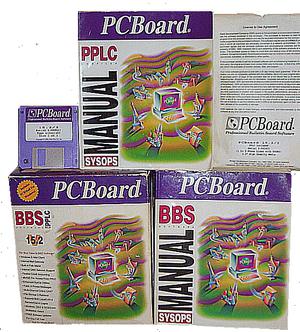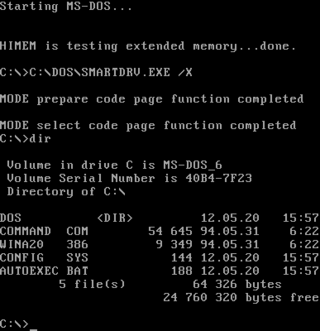Kermit is a computer file transfer and management protocol and a set of communications software tools primarily used in the early years of personal computing in the 1980s. It provides a consistent approach to file transfer, terminal emulation, script programming, and character set conversion across many different computer hardware and operating system platforms.

WordStar is a word processor application for microcomputers. It was published by MicroPro International and originally written for the CP/M-80 operating system, and later written also for MS-DOS and other 16-bit PC OSes. Rob Barnaby was the sole author of the early versions of the program.
Synchronet is a multiplatform BBS software package, with current ports for Microsoft Windows, Linux, and BSD variants. Past versions also ran on MS-DOS and OS/2, but support for those platforms were dropped in version 3.0.
ZMODEM is an inline file transfer protocol developed by Chuck Forsberg in 1986, in a project funded by Telenet in order to improve file transfers on their X.25 network. In addition to dramatically improved performance compared to older protocols, ZMODEM offered restartable transfers, auto-start by the sender, an expanded 32-bit CRC, and control character quoting supporting 8-bit clean transfers, allowing it to be used on networks that would not pass control characters.
XMODEM is a simple file transfer protocol developed as a quick hack by Ward Christensen for use in his 1977 MODEM.ASM terminal program. It allowed users to transmit files between their computers when both sides used MODEM. Keith Petersen made a minor update to always turn on "quiet mode", and called the result XMODEM.
YMODEM is a file transfer protocol used between microcomputers connected together using modems. It was primarily used to transfer files to and from bulletin board systems. YMODEM was developed by Chuck Forsberg as an expansion of XMODEM and was first implemented in his CP/M YAM program. Initially also known as YAM, it was formally given the name "YMODEM" in 1985 by Ward Christensen, author of the original XMODEM.

PCBoard (PCB) was a bulletin board system (BBS) application first introduced for DOS in 1983 by Clark Development Company. Clark Development was founded by Fred Clark. PCBoard was one of the first commercial BBS packages for DOS systems, and was considered one of the "high end" packages during the rapid expansion of BBS systems in the early 1990s. Like many BBS companies, the rise of the Internet starting around 1994 led to serious downturns in fortunes, and Clark Development went bankrupt in 1997. Most PCB sales were of two-line licenses; additional line licenses were also available.

Punter is a protocol for file transfer developed in the 1980s by Steve Punter. There are various types of Punter such as PET Transfer Protocol (PTP), C1 and C2.

Charles Alton "Chuck" Forsberg developed two data transmission protocols popular in the 1990s, for uploading and downloading files from dial-up bulletin board systems. He received a Dvorak Award for Excellence in Telecommunications in 1992 for developing ZMODEM. He was also the project engineer on the Tektronix 4010-series graphics terminals.
ProTERM is a terminal emulator and modem program for the Apple II and Macintosh lines of personal computers, published by Intrec Software. Most popular in the late 1980s and 1990s, it was most commonly used for calling bulletin board systems (BBSes) via a computer's modem, experienced users could also Telnet into Unix server and shell account thereon and FTP and tunneling to various destinations therefrom, and once logged into a Unix shell account, other forms of telecom all across the pre-Web Internet; via VT100 terminal emulator or ANSI art, this later ushered in Graphics to the scene.
HyperACCESS is a family of terminal emulation software by Hilgraeve. A version of HyperACCESS called HyperTerminal is included in some versions of Windows.
BiModem was one of the last file transfer protocols developed for use in bulletin board systems. It was created by Erik Labs, and was revolutionary for its day.
ZMax is a file transfer protocol developed in 1990-1991 by Mike Bryeans who also developed TMODEM.
The Microcom Networking Protocols, almost always shortened to MNP, is a family of error-correcting protocols commonly used on early high-speed modems. Originally developed for use on Microcom's own family of modems, the protocol was later openly licensed and used by most of the modem industry, notably the "big three", Telebit, USRobotics and Hayes. MNP was later supplanted by V.42bis, which was used almost universally starting with the first V.32bis modems in the early 1990s.
Datastorm Technologies, Inc., was a computer software company that existed from 1986 until 1996. Bruce Barkelew and Thomas Smith founded the company to develop and publish ProComm, a general purpose communications program for personal computers. ProComm flourished in the pre-World Wide Web world, when personal computers used modems to connect over telephone lines with other individual computers, online services such as CompuServe, bulletin board systems (BBSs), Telnet and Gopher sites, and the like. Datastorm was the first company to grow from a shareware publisher into a large commercial software publisher. ProComm 2.4.3 for MS-DOS is still available as shareware.

ZTerm is a shareware terminal emulator for Macintosh operating system. It was introduced in 1992 for System 7 and has been updated to run on macOS. Its name comes from its use of the ZModem file transfer protocol, which ZTerm implemented in a particularly high-performance package. In contrast to the built-in macOS Terminal app, which only communicates with other programs, ZTerm only communicates with hardware serial ports.

DOS is a family of disk-based operating systems for IBM PC compatible computers. The DOS family primarily consists of Microsoft's MS-DOS and a rebranded version, IBM PC DOS, both of which were introduced in 1981. Later compatible systems from other manufacturers include DR-DOS (1988), ROM-DOS (1989), PTS-DOS (1993), and FreeDOS (1998). MS-DOS dominated the IBM PC compatible market between 1981 and 1995.
FrontDoor was one of the most popular mailers in the FidoNet-compatible networks in the 1990s, acting as the physical representation of the written network node connection and mail handling standards. It was an MS-DOS-based product written by Joaquim Homrighausen. The FrontDoor system contained a Mailer, an Editor, a Terminal, a serial port device driver and configuration utilities. FrontDoor was first released in 1986.
BLAST, like XMODEM and Kermit, is a communications protocol designed for file transfer over asynchronous communication ports and dial-up modems that achieved a significant degree of popularity during the 1980s. Reflecting its status as a de facto standard for such transfers, BLAST, along with XMODEM, was briefly under official consideration by ANSI in the mid-80s as part of that organization's ultimately futile attempt to establish a single de jure standard.
MEGAlink is a file transfer protocol for modem-equipped microcomputers written by Paul Meiners in 1987. Like many protocols of the era, MEGAlink is an expanded version of the seminal XMODEM. While it was a relatively simple and high-performance system, it remains relatively obscure because it was overshadowed by ZMODEM, which had been released a year earlier and saw rapid uptake.





